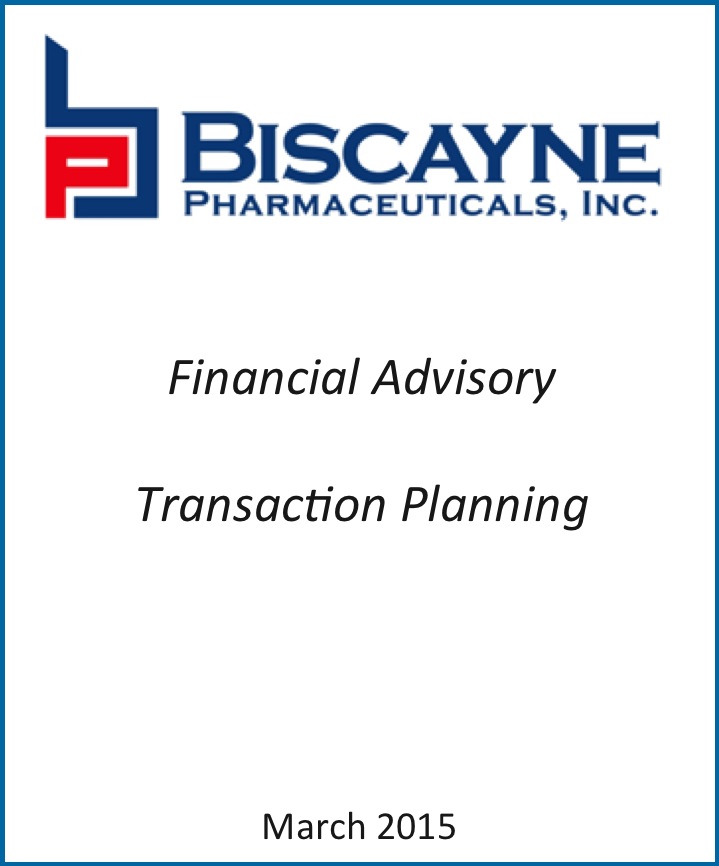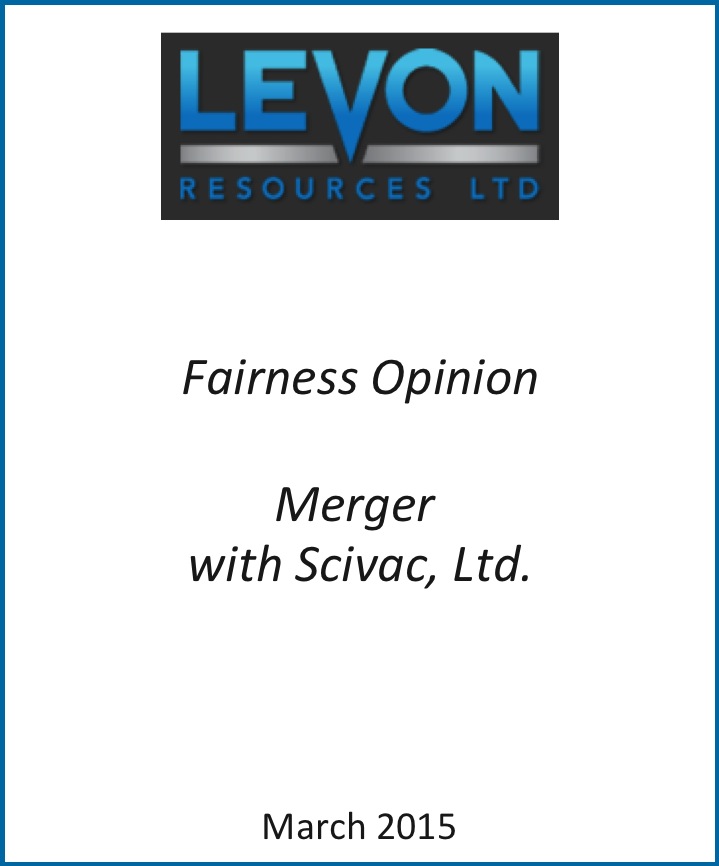From: Marketwire – Canada
Mar-20-2015 8:30 AM
VANCOUVER, BRITISH COLUMBIA–(Marketwired – March 20, 2015) –
Levon Resources Ltd. (“Levon”) (TSX:LVN)(OTCQX:LVNVF)
(BERLIN:LO9)(FRANKFURT:LO9) and SciVac Ltd. (“SciVac”)
announced today that they have entered into an arrangement
agreement pursuant to which Levon will acquire 100% of the issued
and outstanding ordinary shares of SciVac by way of a court-approved
plan of arrangement (the “Arrangement”).
“I am excited to announce this transaction with SciVac, as I believe
it will generate tremendous value for Levon shareholders,” stated Ron
Tremblay, President and Chief Executive Officer of Levon. “In a difficult
market for resource issuers, we have chosen to preserve capital while
seeking to identify alternatives to create shareholder value. The
acquisition of SciVac gives Levon ownership of Sci-B-Vac(TM), a
commercial stage, potentially best in class hepatitis B vaccine which
could address a significant market opportunity. Levon shareholders will
also maintain an interest in Levon’s existing business and assets by
receiving shares of a newly formed company which will hold Levon’s
existing resource assets.”
Pursuant to the Arrangement, Levon shareholders will receive one new
common share of Levon (each a “New Levon Share”) and 0.5 of a
commonshare (each, a “Spinco Share”) of 1027949 BC Ltd., a newly
formedexploration company (“Spinco”) in exchange for each common
share of Levon (each a “Levon Share”) held by them. Upon closing
of the Arrangement, Levon shareholders will hold 100% of the
issued and understanding Spinco Shares and 31.6% of the issued and
outstanding New Levon Shares, with the former holders of SciVac
Shares holding the remaining 68.4% of the issued and outstanding
New Levon Shares.
In addition to acquiring all of the issued and outstanding shares
of SciVac, Levon will retain CAD $27 million in cash. All other
assets and liabilities of Levon will be transferred to or will be
assumed by Spinco. At the closing of the Arrangement, Levon expects
that in addition to holding all of Levon’s mineral properties,
including Levon’s flagship Cordero Project, SpinCo will have
approximately $20.1M in working capital, including approximately
$3M in cash, a $1.1M convertible debenture as well as 35,178,572
shares of Pershing Gold Corporation with current estimated value
of $16M. SpinCo will also hold a $2M Mexican value added tax
receivable that Levon expects will be recovered. The total of 22.1M
represents approximately 48% of Levon’s working capital as at
December 31, 2014.
“SciVac is pleased to announce this transaction with Levon in furtherance
of our goal of expanding market opportunities for SciVac products in
development, including Sci-B-Vac, our third-generation hepatitis B
vaccine,” said Dr. Curtis Lockshin, Chief Executive Officer for SciVac.
“Sci-B-Vac has already been approved in several countries, including
Israel, where it has been provided to hundreds of thousands of newborn
children. We intend to pursue marketing approvals for Sci-B-Vac in the
United States and other territories worldwide, initially focused on
at-risk populations such as End-Stage Renal Disease and HIV patients.
In addition, we believe the transaction will permit SciVac to cultivate
a pipeline of other therapeutics, utilizing novel treatment approaches
in various disease areas with unmet needs.”
SciVac is currently a privately owned company, of which approximately
45% of the shares are owned by OPKO Health, Inc. (NYSE:OPK).
OPKO’s CEO and Chairman, Dr. Phillip Frost, commented, “This
transaction with Levon presented an opportunity to unlock meaningful
value for OPKO shareholders via OPKO’s ownership interest in SciVac.
SciVac is a commercial-stage biotech leader in protein engineering whose
flagship product, Sci-B-Vac, is a superior next generation hepatitis
B vaccine. Sci-B-Vac has received approval for use in ten countries
including Israel, where it captures half the market for neonatal
hepatitis B vaccinations, and is offered to adults who do not respond
to competing hepatitis B vaccines. It appears positioned to expand
the billion dollar global hepatitis B vaccine market upon successful
completion of the FDA approval process.”
The board of directors of Levon has unanimously approved the
transaction and all directors and officers of Levon, collectively
holding approximately 10.08% of the number of Levon Shares and
76.94% of the number of options to purchase Levon Shares
(the “Levon Options”) anticipated to be entitled to vote at a special
meeting to consider the Arrangement, have agreed to vote in favour
of the Arrangement.
Arrangement Details
The Arrangement will be effected by way of a court-approved plan
of arrangement and will require the approval of at least 2/3 of the
votes cast by Levon’s shareholders and optionholders at a special
meeting expected to take place in April 2015 (the “Meeting”). The
transaction is also subject to applicable regulatory approvals,
including approval of the TSX, and the satisfaction of certain closing
conditions customary in transactions of this nature.
The Arrangement will result, through a series of transactions, in:
— Levon shareholders receiving one New Levon Share and 0.5 of a
Spinco
Share for each Levon share currently held by them;
— holders of SciVac Shares receiving that number of New Levon
Shares
representing 68.4% of the issued and outstanding New Levon Shares in
exchange for the acquisition by Levon of all of the issued and
outstanding SciVac Shares;
— the change of Levon’s name to “SciVac Inc.”; and
— the change of Spinco’s name to “Levon Resources Ltd.”
Holders of outstanding Levon stock options may exercise their
options until the effective time of the Arrangement, at which time
they will be cancelled.
On completion of the Arrangement, Spinco will own and operate
the existing business of Levon and Levon will own and operate
the existing business of SciVac. Levon shareholders who receive
New Levon Shares and Spinco Shares under the Arrangement will hold
100% of the issued and outstanding Spinco Shares and 31.6% of the
issued and outstanding New Levon Shares, with the former holders
of SciVac Shares holding the remaining 68.4% of the issued and
outstanding New Levon Shares.
After taking into consideration, among other things, the terms of
the Arrangement, the unanimous recommendation of a special committee
of Levon directors established to review the Arrangement and discussions
with its legal and financial advisors, Levon’s board of directors has
unanimously concluded that the Arrangement is in the best interests of
Levon and has approved the Arrangement. Levon’s board of directors
intends to recommend in the management information circular to be mailed
in connection with the Meeting that Levon’s shareholders and optionholders
vote in favour of the Arrangement.
Subject to SciVac’s right to match, Levon’s board of directors may
terminate the arrangement agreement in favour of an unsolicited
superior proposal upon payment of a US$1 million break fee to SciVac.
Advisors
Levon’s legal counsel is Stikeman Elliott LLP and Dorsey &
Whitney LLP. Cassel Salpeter & Co., LLC is Levon’s financial advisor.
About Levon Resources Ltd.
Levon is a gold and precious metals exploration Company, exploring the
company’s 100% owned flagship Cordero bulk tonnage silver, gold, zinc,
and lead project near Hidalgo Del Parral, Chihuahua, Mexico.
About SciVac Ltd.
SciVac Ltd., headquartered in Rehovot Israel, is in the business of
developing, producing and marketing biological products for human
healthcare. SciVac’s flagship product Sci-B-Vac is a recombinant 3rd
generation hepatitis B vaccine. SciVac also offers contract development
and manufacturing services to the life sciences and biotechnology
markets.
ON BEHALF OF THE BOARD
Ron Tremblay, President and Chief Executive Officer
Safe Harbour Statement – This news release contains “forward-looking
information” and “forward-looking statements” (together, the
“forward-looking statements”) within the meaning of applicable
securities laws and the United States Private Securities Litigation
Reform Act of 1995. These forward-looking statements, include,
but are not limited to, statements regarding the completion of
the Arrangement and the various steps thereto, the mailing of
a management information circular in connection with the Meeting and
the holding of the Meeting and are made as of the date of this news
release. Readers are cautioned not to place undue reliance on
forward-looking statements, as there can be no assurance that the
future circumstances, outcomes or results anticipated in or implied
by such forward-looking statements will occur or that plans, intentions
or expectations upon which the forward-looking statements are based
will occur. While we have based these forward-looking statements on our
expectations about future events as at the date that such statements were
prepared, the statements are not a guarantee that such future events
will occur and are subject to risks, uncertainties, assumptions
and other factors which could cause events or outcomes to differ
materially from those expressed or implied by such forward-looking
statements.
Neither the Toronto Stock Exchange (“TSX”) nor its Regulation Services
Provider (as that term is defined in the policies of the TSX)
accepts responsibility for the adequacy or accuracy of this release.
The securities to be issued pursuant to the Arrangement have not been and
will not be registered under the United States Securities Act of 1933, as
amended (the “U.S. Securities Act”) or the securities laws of any state
of the United States and may not be offered or sold absent such
registration or an available exemption from such registration requirements.
The securities in the Arrangement are anticipated to be offered and sold
pursuant to the exemption from registration under Section 3(a)(10) of
the U.S.Securities Act and pursuant to similar exemptions under any
applicable securities laws of any state of the United States. This press
release does not constitute an offer to sell or the solicitation of an
offer to buy any of the securities.
FOR FURTHER INFORMATION PLEASE CONTACT:
Levon Resources Ltd.
Investor Relations
Direct: 604-682-2991
ir@levon.comLevon Resources Ltd.Ron Tremblay
President and Chief Executive Officer
604-682-3701
www.levon.com
Source: Levon Resources Ltd.










